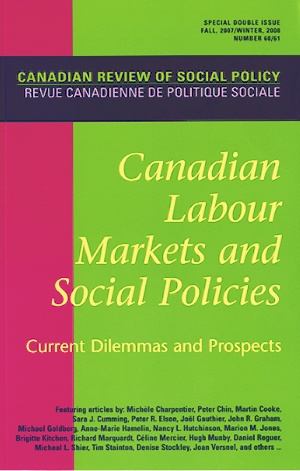Obligations and Irony in the Workplace Accomodations: A Case STudy in a Large Corporate Office
Résumé
This paper reports a multiple-perspective case study of a worlcer with a severe visual impairment and the accommodations that she received and made in a workplace that was conszdered a leader in hiring and accommodating workers with disabilities. Data for the study consisted of observations in the offices of this large corporation, interviews with the focal individual as well as with her supervisor, a colleague, and a human resources professional. Standard qualitative analyses were guided by six facets of negotiating accommodations derived from an extensive review of literature across a number of disciplines. The six facets are: (a) access and disclosure; (h) structural affordances; (c) social context; (d) motivation; (e) understanding of social policy; and ( f ) cognitive problem solving. By attending to these six facets, we demonstrate the ironies that abound in workplaces that emphasize providing accommodations, primarily structural accommodations, while ignoring the process of negotiating accommodations proactively. Ironies also arise in the use of technology to provide structural accommodations while ignoring the power of technology to educate coworkers and supervisors about social policy and to enable ongoing collaborative and cognitive problem-solving as a way of negotiating accommodations. Perhaps the policy should promote duty to negotiate as well as duty to accommodate. Cet article analyse sous plusieurs angles le cas d'une travailleuse aux prises avec une dificience visuelle grave en rapport avec les am6nagements effecttks, par l'employeur et elkmgme, dans un milieu de travail considiri comme un chef de file en matisre d'embauche et d'ame'nagements pour les travailleurs handicape's. Les dondes utilise'es dans cette e'tude prouiennent d'observations effectue'es dans les bureaux de cette waste entrepnse, d'entrevues auec h travailleuse concerne'e ainsi qu'avec son superviseur, un colkgue et un professionnel des ressources hurnaines. analyse qualitative standard effectde par l'auteur repose sur six aspects relatifs & h ne'gociation d'am'nagements, e'tablis h la suite d'une minutieuse analyse de la documentation pertinente dans une varie'te' de disciplines. Ces six aspects sont : a) l'accessibilite' et la divulgation; b) les ressources structurelles; c) le contexte social; d) la motivation; e) la compre'hension des politiques; et f) la re'solution de probhe cognitive. En nous appuyant sur ces six aspects, nous avons montre' l'ironie qui rsgne dans certains lieux de travail qui se targuent d'offrir des ame'nagements, principalement d'ordre swucturel, alors qu'ils omettent de ne'gocier des am&nagements de fagon proactive. Cette ironie se manifeste e'galement dans l'utilisation, par les entreprises, de la technologie pour offrir des ame'nagements structurels, alors qu'elles n'ont pas recours h la puissance de cette technologie pour informer les collsgues et superviseurs au sujet des politiques sociales et pour faciliter l'e'tablissement d'un processus coope'ratif et cognitif de re'solution de probkmes visant h ne'gocier des ame'nagements. Les politiques dewaient peut-&me faire la promotion de l'obligation de dgocier paralklement h l'obligation d'effectuer des ame'nagements.Téléchargements
Publié-e
Comment citer
Numéro
Rubrique
Licence
1-The author guarantees that the manuscript is an original work not published elsewhere in print or electronically in whole or in part, except in abstract form, that the author has the full power to make this contribution, and that the manuscript contains no matter libelous or otherwise unlawful or which invades the right of privacy or which infringes any proprietary right.
2-The author guarantees that the manuscript has not been previously published in print or electronically and that if the manuscript contains any tables, figures or images fully reproduced or closely adapted from previously published material, the author must obtain the necessary permission from the author/publisher holding the original copyright prior to publication in CRSP. The author may be required to produce evidence of permission granted to CRSP’s editors.
3-As a condition of publication in CRSP, the author assigns all copyright to CRSP, including but not limited to the right to publish, republish, and otherwise distribute this manuscript in print, electronic, or other formats. As CRSP is a non-profit interdisciplinary scholarly journal, the author will receive no royalty or other monetary compensation for the assignment set forth in this agreement.
For the purpose of full disclosure, CRSP will not normally use the content provided by the author in a commercial venture, but for the purpose of disseminating the author’s content to as many readers as possible. For distribution, third parties engaging in commercial activities may be contracted to distribute the content globally, and such parties may make a profit out of the author’s content in their normal course of business. CRSP will not pay the author or reimburse the author in any form based on such commercial activities because the conduct of such commercial activities is outside the control of CRSP.
Any future reference to or use of this published material by the authors must acknowledge CRSP as the original place of publication.
PERMISSION REQUEST/ARCHIVING
Permission is given to author(s) receiving funding via Tri-Council Agencies, the Canadian Institutes of Health Research (CIHR), the Natural Sciences and Engineering Research Council of Canada (NSERC) and the Social Sciences and Humanities Research Council (SSHRC), to make their publications freely available in an Open Access repository within the stated deadline by the Tri-Council Agencies (12 months following publication). Archiving of publication must be a manuscript copy bearing none of the CRSP headers, footers or any other distinguishing marks. No links to the article on the CRSP website is permitted.
Permission requests from third parties to reproduce articles in part or full in academic/educational publications can be directed to the managing editor of CRSP, and will not be unreasonably denied.

